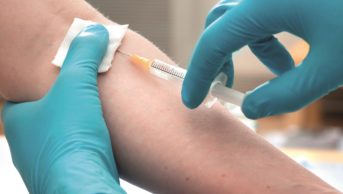
Courtesy of Nadira Callachand
What is your current role and what path did you take to get here?
Since 2014, I have been working as the pharmacy services development manager for Hibernian Healthcare in Dublin, which offers training services to patients and healthcare professionals. I completed my pharmacy degree at Queen’s University Belfast before working in community pharmacy for ten years as a supervising pharmacist/manager. I also ran an influenza vaccination service for three years. I joined Hibernian Healthcare in 2012 as a vaccine administration tutor and completed a ‘Train the Trainer’ Further Education and Training Awards Council/Quality and Qualifications Ireland (FETAC/QQI) level 6 qualification with Team Life Coaching and Training in 2014.
I am also programme lead for several vaccination related programmes within the UK, and in March 2016, I was appointed as a company director.
What are the main responsibilities associated with your role?
I am responsible for the development of live and e-learning vaccination training for Irish pharmacists. The role is extremely varied and exciting! I may be researching content, editing material or liaising with our e-learning programme developers. I also review content and any suggested edits from our programme development and quality assurance teams. It requires hard work, patience and attention to detail, but we pharmacists are good at that!
We run our live training sessions prior to flu season. I organise the training day and work with other healthcare professionals in areas such as vaccinating pharmacists, doctors, paramedics and nurses. Only a small number of countries, including Ireland, have introduced pharmacist vaccination services. Hibernian has trained over 2,000 pharmacists in a blended learning format since the service began.
What do you enjoy most about your role and what challenges do you face?
I was attracted to being at the forefront of new pharmacy initiatives. Training pharmacists to administer new vaccines is very rewarding. I am working on additional services which will expand the role of community pharmacists to support patients with chronic illnesses. Pharmacists in Ireland and the UK are eager to embrace new initiatives and I love being involved in this area.
One of the most enjoyable aspects is the variety of work and the opportunity to constantly learn new skills. I work with a fantastic team of people in Ireland, the UK, Asia and America. The expertise of clinicians and developers in my team is an amazing resource; however, managing large projects across multiple time zones can test my organisational skills!
Why did you choose to enter the healthcare training sector?
In Ireland, pharmacist training is an emerging speciality, and having chosen a route that can elevate the position of pharmacists in the healthcare sector is very exciting. As pharmacists advance in service provision, I am able to address their training needs, both online and in person. Training is one of those areas that pharmacists seem to enjoy because learning is such an integral part of what we do. I enjoy mentoring, so it wasn’t difficult to move into a role where providing training is central to the position.
Why should pharmacists be interested in travel health?
Only 50% of individuals receive the necessary travel vaccines before leaving the UK. Pharmacists are therefore able to contribute to global health by delivering travel vaccinations to individuals wanting a convenient and reliable way of preparing for their journey abroad. There is also huge potential to make travel health a successful service within community pharmacy.
Describe the travel health qualification you are currently developing
We are just starting a new venture in the UK — The Inca Travel Health Programme — which will provide an end-to-end solution to travel health vaccination for pharmacies, including online training, software management system and patient group directions.
It is a fully comprehensive e-learning programme designed for UK pharmacists. It guides pharmacists through every aspect of setting up a travel vaccination service with 25 modules covering risk assessment, vaccine-preventable travel diseases, travel health advice, record keeping, how to set up the service and a wide range of scenarios to test knowledge. For those who have not previously vaccinated, we also cover administration techniques, dealing with adverse events, anaphylaxis treatment and CPR.
For more information visit: https://incahealthcare.co.uk/
How should community pharmacies go about implementing a travel health services?
It is vital for pharmacists to have up-to-date parenteral administration training and CPR training. You should also complete training specifically in travel health; this will equip you with sufficient knowledge on the vaccines and diseases relevant to travel health. The pharmacy must have a private consultation room to reflect the clinical service being provided and must be of a suitable size to allow comfortable administration of the vaccines. As with all procedures in the pharmacy, standard operating procedures for the service must be in place. Careful planning will ensure the service is smoothly implemented in your pharmacy.
What potential pitfalls should community pharmacies be aware of when providing such a service?
Before you commence the service, reflect on how you see the service running alongside your other pharmacy services. Adequate staffing is essential, as travel consultations take a minimum of 20 minutes. Do you have enough staff to support you while you carry out the consultations — for example, a support pharmacist on duty? Having an appointment system for patients is a really useful way of managing your time and ensuring you are relaxed and focused on the travel consultation. You may need to refer to training material on more than one occasion when you get started! With many travel vaccines available, it takes time to become confident with the administration schedules, so have resources close at hand to refer to.
What advice would you give to pharmacists who wish to pursue a career like yours?
There are plenty of opportunities for pharmacists to work with various training and education providers delivering local training and mentoring, or developing and delivering national programmes to other pharmacists, healthcare professionals or the general public. Think of all the things we do on a day-to-day basis that others would benefit from knowing about. I’m happy to share everything I have learned along the way, and I would encourage individuals to look for opportunities to share their knowledge too!


